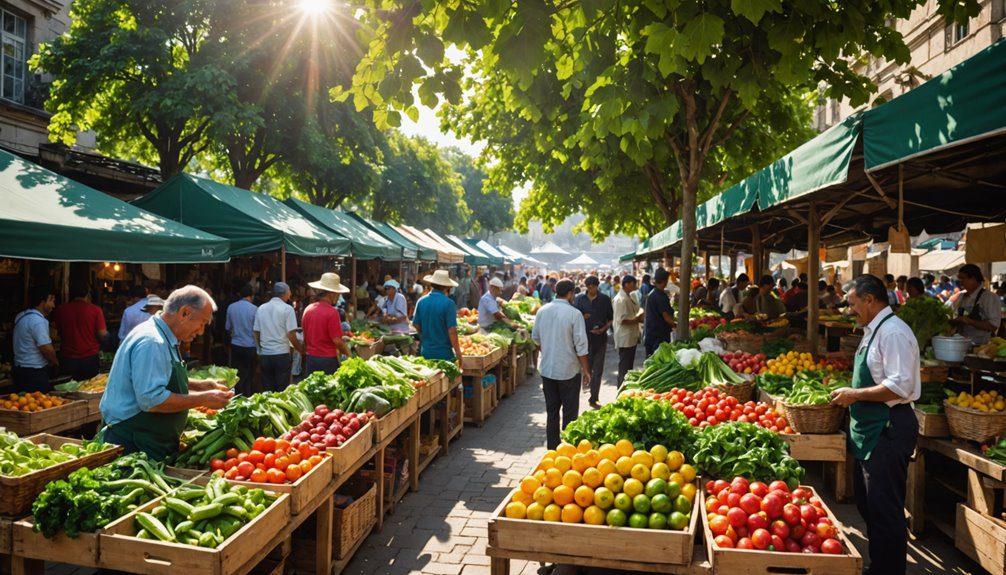If you're involved in the agricultural sector in South Carolina, you might want to consider the SC Dealers and Handlers of Agricultural Products Bond. This bond isn't just a regulatory formality; it's a critical safeguard that can protect your business and enhance your credibility in a competitive market. Understanding who needs this bond and its implications can significantly impact your operations. But what happens if you decide not to secure it? The potential consequences might surprise you, and there's more to explore regarding the benefits it offers to both you and your partners.
Overview of Agricultural Bonds

Agricultural bonds play a crucial role in supporting the farming industry, ensuring that dealers and handlers of agricultural products can operate smoothly. These bonds act as a financial safety net, providing assurance to both producers and consumers that transactions will be completed fairly and responsibly.
When you engage in the agricultural market, you'll find that these bonds help maintain trust and reliability among all parties involved.
You've got different types of agricultural bonds depending on the specific needs of your business. For example, some bonds focus on ensuring that dealers comply with regulations, while others guarantee the payment for the products received. This flexibility enables you to choose the bond that best suits your operational requirements.
In most cases, obtaining an agricultural bond requires demonstrating financial stability and adherence to industry standards. By securing these bonds, you're not only protecting your business but also contributing to the overall integrity of the agricultural sector.
As you navigate the complexities of agricultural transactions, understanding the role of these bonds becomes essential in fostering a stable and trustworthy market environment.
Importance of the Bond
Recognizing the importance of the bond is essential for anyone involved in the agricultural sector. This bond serves as a financial safety net, protecting you against potential losses that may arise from transaction failures or defaults by dealers and handlers.
By securing this bond, you're not just complying with state regulations; you're also demonstrating your commitment to ethical business practices.
The bond acts as a guarantee that you'll fulfill your contractual obligations, which builds trust among your partners and customers. When you have this bond in place, you're signaling to the market that you're a reliable player, which can enhance your reputation and open doors to new opportunities.
Moreover, in an industry where fluctuations in prices and market conditions can be unpredictable, having this bond provides peace of mind. You won't have to worry as much about the financial repercussions of unforeseen challenges.
In essence, it safeguards your interests and supports the overall stability of the agricultural marketplace, allowing you to operate with greater confidence and focus on growth.
Who Needs the Bond?

Who exactly needs the Dealers and Handlers of Agricultural Products Bond? If you're involved in the agricultural sector, particularly as a dealer or handler of agricultural products, you likely need this bond. This includes businesses that buy, sell, or process crops, livestock, or other agricultural goods.
Whether you're a wholesaler, retailer, or processor, this bond is essential for ensuring compliance with state regulations.
Farmers who sell their products directly to consumers mightn't need the bond, but if you're engaged in larger-scale transactions or dealing with multiple producers, it's a different story. Additionally, if you're a broker who facilitates transactions between producers and buyers, you'll also require this bond.
The bond acts as a safeguard, protecting your clients and the industry from potential financial loss caused by your failure to meet contractual obligations. Moreover, obtaining this bond helps ensure compliance with USDA regulations, thereby reinforcing market integrity and trust within the agricultural sector.
If you're considering entering the agricultural market or expanding your operations, it's crucial to assess whether you need this bond. Not only does it establish credibility, but it also ensures you're operating within the legal framework, helping you avoid potential pitfalls and fostering trust with your partners and customers.
Bond Requirements and Regulations
When you decide to operate as a dealer or handler of agricultural products, understanding the bond requirements and regulations is crucial. These bonds are designed to protect producers and sellers, ensuring that you adhere to industry standards. Typically, you'll need to secure a surety bond, which acts as a guarantee that you'll fulfill your financial obligations.
The amount of the bond can vary based on the volume of products you handle and state-specific regulations. It's important to check local laws to determine the required bond amount for your operation. In South Carolina, for example, the bond amount may be influenced by your sales volume over a designated period.
You'll also need to maintain your bond throughout your operational period. If you fail to meet the regulatory requirements, you risk losing your bond and facing penalties.
Additionally, it's essential to work with a reputable surety provider who understands agricultural regulations, as they can guide you through the process and ensure compliance with all requirements. Understanding these regulations not only helps protect your business but also builds trust with your clients and partners in the agricultural community.
Application Process for Dealers

Navigating the application process for becoming a dealer of agricultural products can seem daunting, but it doesn't have to be. Start by gathering all necessary documents, including proof of your business registration, identification, and any financial statements required by your state.
You'll want to ensure you meet any specific eligibility criteria set by the regulatory body governing agricultural dealers in your area.
Next, complete the application form accurately and clearly. Double-check your information to avoid any delays. Once your application is filled out, you may need to submit a bond, which acts as a guarantee for your business transactions.
Familiarize yourself with the amount required, as it varies by state and the volume of products you plan to handle.
After submission, be prepared for a review process. This may involve background checks or interviews to verify your qualifications and intentions. Keep your contact information updated, as officials may reach out for additional information.
Types of Agricultural Products Covered
Understanding the types of agricultural products covered under dealer regulations is crucial for anyone looking to enter this industry. The products typically include a wide range of items, such as grains, fruits, vegetables, and livestock.
If you're planning to deal with these products, it's important to know what falls under this umbrella. For instance, grains like corn, wheat, and soybeans are commonly regulated.
You might also find yourself handling fresh produce, which includes everything from apples to zucchini. Livestock, such as cattle, pigs, and poultry, also falls within the scope of these regulations.
Additionally, processed agricultural products, like packaged food items or dairy products, may require your attention as well.
Financial Implications of the Bond

Many dealers in agricultural products often underestimate the financial implications of securing a bond. When you obtain this bond, you're not just meeting a regulatory requirement; you're also making a significant financial commitment. The bond amount can vary widely, often depending on your business size and annual revenue. This upfront cost can impact your cash flow, especially for new or smaller operations.
Additionally, the premium you pay for the bond is an ongoing expense that can affect your overall profitability. Insurers consider factors like your creditworthiness and business history, which can lead to higher premiums if you're seen as a higher risk. So, it's crucial to shop around and compare quotes to find the best rates.
Moreover, maintaining the bond requires you to stay compliant with industry regulations. Failing to do so can lead to penalties, which could further strain your finances. Furthermore, the bond ensures compliance with state laws and regulations, protecting both your business and the consumers you serve.
In essence, while securing a bond is vital for your business, understanding the financial implications helps you prepare for the costs involved and ensures you're making a sound investment in your operation's future stability and credibility.
Risks of Non-Compliance
Failing to comply with the requirements of your agricultural products bond can lead to serious repercussions for your business. Non-compliance can result in hefty fines, which can significantly impact your bottom line. You may also face legal action from regulators, leading to costly lawsuits and potential damage to your reputation.
Additionally, your inability to meet bond obligations can hinder your ability to secure future contracts or partnerships. Clients and suppliers might see you as a higher risk, limiting your opportunities for growth and collaboration.
Moreover, if you're found to be non-compliant, your license to operate could be suspended or revoked. This not only disrupts your current operations but also jeopardizes your existing relationships with farmers and producers.
Lastly, the stress of dealing with compliance issues can distract you from running your business effectively. You'll find yourself spending valuable time addressing legal matters instead of focusing on your core operations.
In short, ensuring compliance with your agricultural products bond is essential for maintaining a successful and sustainable business. Don't underestimate the risks associated with non-compliance; they can have lasting effects on your operations and reputation.
Benefits for Farmers and Producers

Farmers and producers reap significant benefits from having a reliable agricultural products bond in place. This bond acts as a safety net, ensuring that you receive payment for your goods promptly and reducing the risk of financial loss.
When you work with licensed dealers and handlers who hold a bond, you can trust that they're committed to upholding their contractual obligations.
Additionally, having a bond helps you establish credibility in the marketplace. Buyers often prefer dealing with bonded dealers, knowing they're protected against potential fraud or non-compliance. This trust can open doors to more lucrative business opportunities and foster long-lasting relationships with your buyers.
Moreover, the bond can provide a level of security that encourages you to focus on your core agricultural activities without worrying about payment disputes. With this protection in place, you can grow your operation confidently, knowing that your financial interests are safeguarded.
Resources for Further Information
To stay informed about agricultural products bonds and their benefits, you can access a variety of resources. Start with your local agricultural extension office, where knowledgeable staff can provide insights specific to your region. They often host workshops and seminars that cover bonding requirements and best practices for dealers and handlers.
Next, check out the official state department of agriculture website. They typically offer up-to-date regulations, application processes, and guidelines regarding agricultural products bonds. You'll also find contact information for key personnel who can answer your questions directly.
Additionally, industry associations like the National Association of State Departments of Agriculture (NASDA) provide valuable resources and networking opportunities. Their publications often include articles on bonding-related topics and current trends affecting the agricultural sector.
Lastly, consider reaching out to bonding companies that specialize in agricultural products. They can help clarify the bonding process and provide tailored advice based on your business needs.
Conclusion
In conclusion, securing the SC Dealers and Handlers of Agricultural Products Bond is vital for anyone involved in the agricultural sector. It not only ensures compliance with regulations but also builds trust with your clients and partners. By obtaining this bond, you protect yourself from potential financial losses and contribute to a stable market. Don't overlook the importance of this bond—investing in it can lead to greater credibility and success in your agricultural endeavors.


